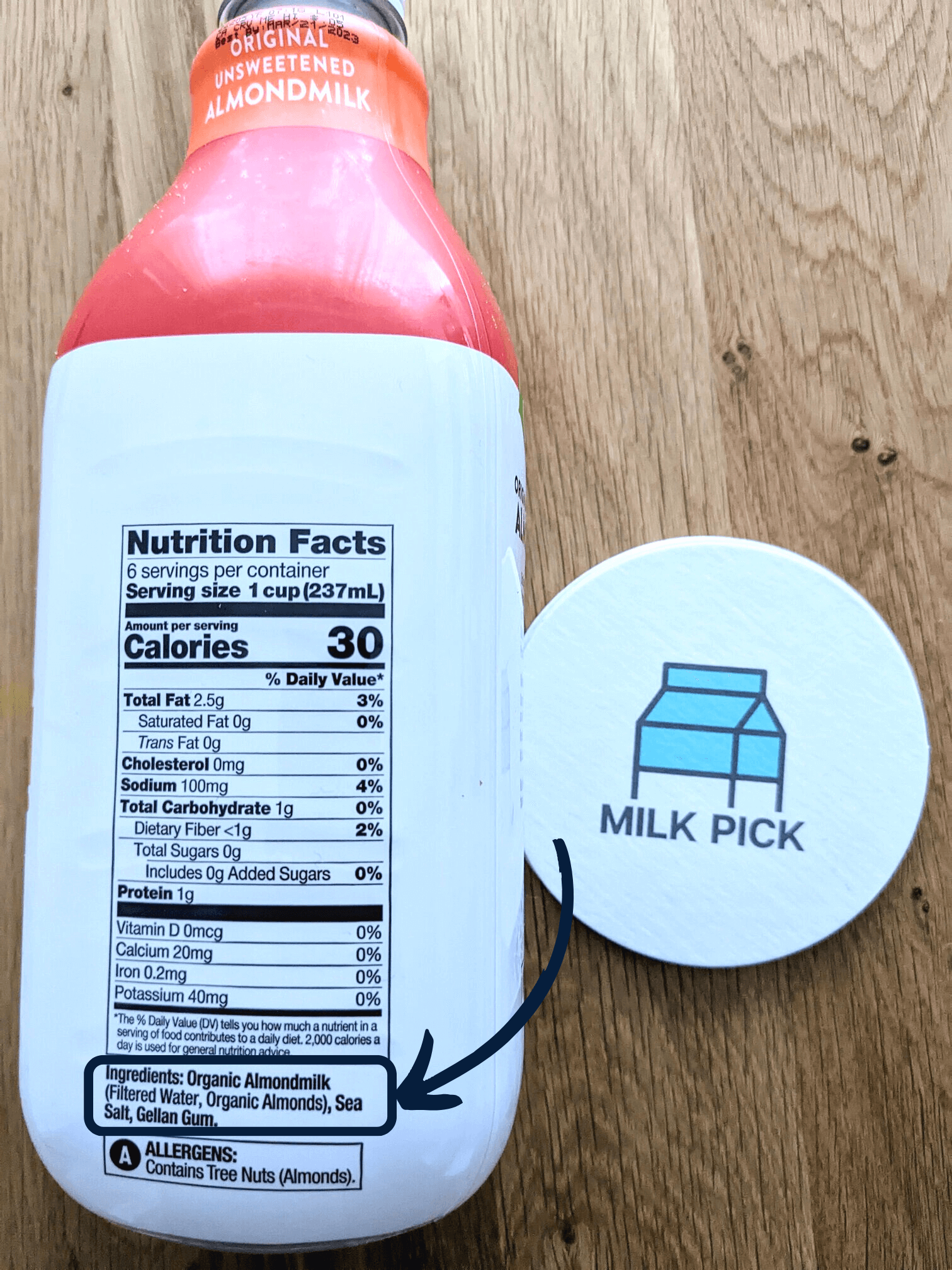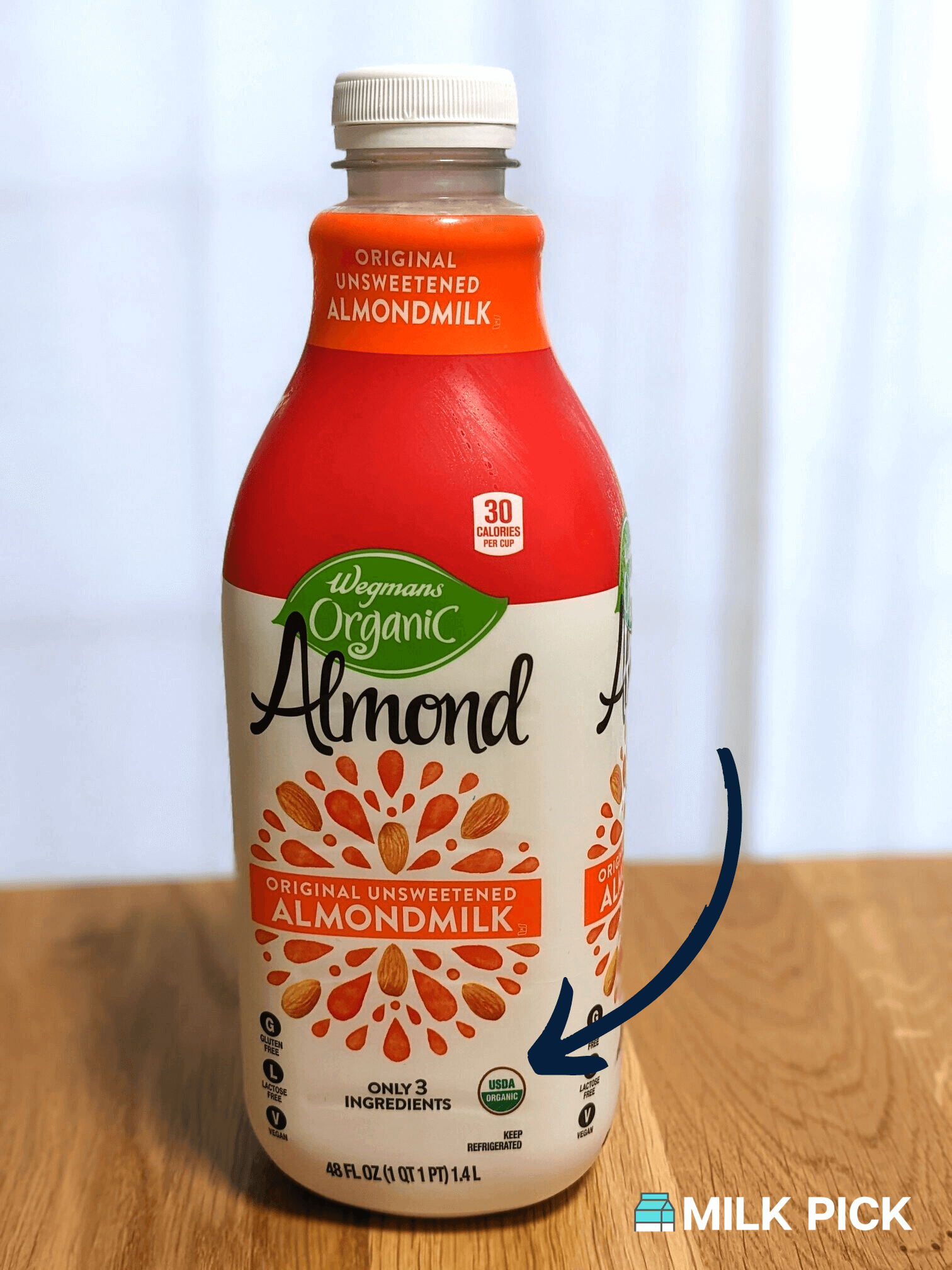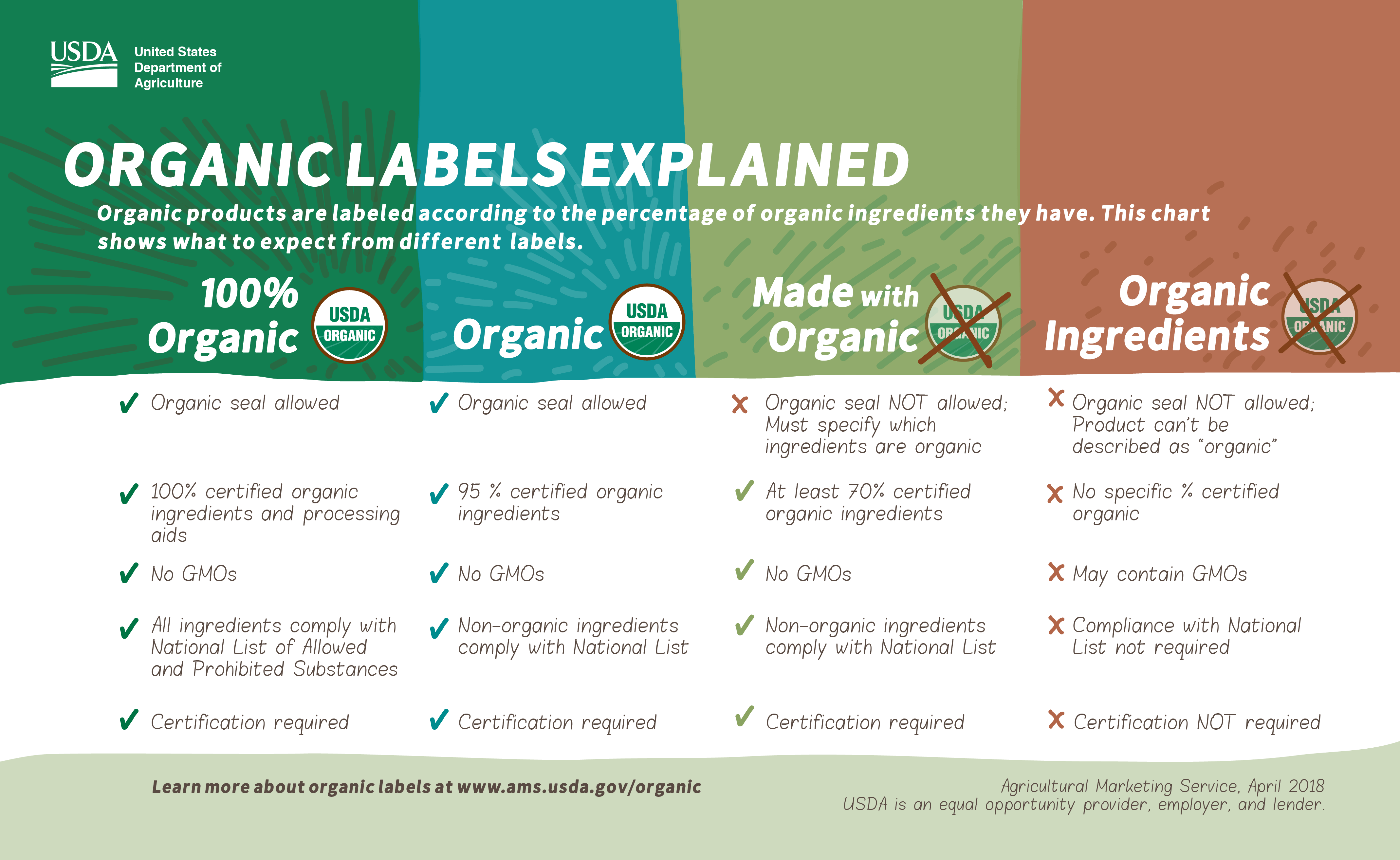You're in the milk aisle of the grocery store and you're trying to decide between the 10 different almond milk options. You're stuck between organic and non-organic (conventional).
Which should you choose?
In most cases, it's best to go with organic almond milk because it contains fewer pesticides, no GMOs, and is better for the environment.
If you're struggling to justify the higher price tag for organic almond milk, read on to find out why it's worth it (and how to save money when buying organic!)
What Does "Organic" Mean In Terms of Food?
The United States Department of Agriculture (USDA) has special requirements regarding organic foods and how they are labeled.
Federal guidelines for organic foods address elements like additives, pesticides, and soil quality and require farmers and food manufacturers to use natural farming methods and substances as much as possible.
The USDA says farmers can call produce organic if prohibited substances have not contaminated the soil it's grown in for at least three years before harvest.
Synthetic pesticides and fertilizers are considered prohibited substances. This rule has a few exceptions, such as pheromones and vaccines for animals.
For multi-ingredient foods, the USDA offers additional regulations. These include organic standards such as:
- Prohibiting artificial colors, flavors, and preservatives
- Ingredients must be organic
Processed foods may contain non-agricultural ingredients such as pectin, baking soda, or enzymes and still be considered organic.
Packaged products with some organic ingredients must contain at least 70% organically grown ingredients for the component claiming to be organic.
The remaining ingredients can be produced using substances that aren't allowed in 100% organic products but still can't use prohibited growing practices.
What is Organic Almond Milk?
Organic almond milk is almond milk made with organic ingredients.
Some almond milk is 100% organic, which means all ingredients, including almonds or other components, like vanilla extract, are USDA organic.
Other almond milk may contain organic almonds or other ingredients that are not organic.

For example, New Barn Organics is USDA Certified organic almond milk. It contains organic almondmilk (organic almonds and filtered water) and salt.
Elmhurst 1925's almond milk contains similar ingredients, almonds and filtered water, but doesn't carry the USDA seal since its almonds aren't listed as organic on the nutrition label.
How Can You Tell If Almond Milk is Organic?
If you're searching for 100% organic almond milk, you can look for the USDA seal.
Only certified organic products can place the seal on their products, so if you see it, you know the manufacturer abides by USDA standards for organic growing and harvesting procedures.
The seal is easily recognizable.
It features a brown circular outline around green and white words on two halves inside.
The word "USDA" appears in green on a white background; below that, the word "organic" appears in white text on a green background with a subtle field design.

If an almond milk container says something like "made with organic ingredients" or "contains organic ingredients," it probably contains some organic ingredients; however, without the USDA seal, the product is not classified as organic.
This handy chart from the USDA explains what's considered organic or not organic by their standards.

Benefits of Organic Almond Milk
Organic almond milk offers several benefits over other non-organic brands.
Fresher Than Other Products
Organic almond milk doesn't contain preservatives like other almond milk brands.
No preservatives mean the almond milk doesn't last as long, but it also means that it is made fresh and shipped out in a timely manner either to your door or the supermarket.
A fresher product often means better quality nutrients and taste, so organic almond milk can offer a more vibrant flavor and better nutrients.
Fewer Pesticides
In some locations, pesticides such as clarified hydrochloric extract, glyphosate, Oryzalin, and Ziram are used in almond orchards that don't follow organic farming practices.
Other pesticides used on almond trees include organophosphates and chlorpyrifos, which may increase the risk for children born with autism in mothers who live near these farms.
Per the USDA guidelines, organic produce (including almonds) must be grown without synthetic herbicides, fungicides, and insecticides.
Drinking organic almond milk minimizes the potential for any health issues for humans and wildlife caused by these substances.
Better for the Environment and Local Ecosystems
Organic farming methods used to produce organic almonds are often better for the environment and local ecosystems.
They can help conserve water, reduce pollution and soil erosion, increase soil quality, and utilize less energy.
Organic almond milk like Three Trees uses almonds grown with 100% sustainable farming methods.
New Barn Organics' almonds come from a co-op in Spain that uses environmentally friendly dry-farming methods, unlike other growers who use as much as 3.2 gallons of water for one almond.
GMO-Free
Organic almonds are GMO-free.
GMOs (genetically modified organisms) are plants that have been altered at a cellular level to resist pesticides.
They have been shown to increase the occurrence of allergies and create antibiotic resistance in those who consume them.
When you drink organic almond milk, you can be sure you aren't ingesting any harmful GMOs in your morning coffee or cereal.
Which Almond Milk Brands Are Organic?
The following almond milk brands bear the USDA organic seal and contain these ingredients:
- Wegmans Organic Almondmilk, Original Unsweetened (Organic Almondmilk (Filtered Water, Organic Almonds), Sea Salt, Gellan Gum)
- Malk Almond Milk (Filtered Water, Organic Almonds, Himalayan Pink Salt)
- Three Trees Organic Unsweetened Almond Milk (Filtered Water, Organic Almonds)
- New Barn Organics Unsweetened Almond Milk (Organic Almondmilk (Filtered Water, Organic Almonds), Sea Salt) 59 for six pack
- Better Than Milk Organic Almond Drink (Spring Water, Organic Ground Almonds, Organic Locust Bean Gum)
- Moola Original Almond Milk (Filtered Water, Organic Roasted Almonds, Organic Honey, Less than 2% of Calcium, Sea Salt, Gellan Gum)
Potential Considerations For Organic Almond Milk Vs. Non-Organic Brands
While organic almond milk offers multiple health and environmental benefits, there are a few factors to consider.
Organic almond milk typically doesn't contain the same nutrients as fortified brands.
Most organic almond milk is made with almonds, water, and salt. The number of nutrients organic brands contain may not be as high as those with added Vitamins and minerals.
For example, Wegmans Organic Almondmilk contains minimal calories (30), 1 gram of carbohydrates, 1 gram of dietary fiber, 1 gram of protein, 40 mg of potassium, .20 mg of iron, and 20 mg of calcium.
These nutrients can help you reach your daily recommended allowance; however, it doesn't contain folic acid, vitamin c, or Vitamin D.
The other consideration for some consumers regarding organic almond milk is the price.
You can typically pick up non-organic almond milk for quite a few cents cheaper than organic brands.
If you are on a tight budget, this can impact your decision to buy organic. However, the price difference isn't as steep as many believe and varies based on several factors.
Is Organic Almond Milk More Expensive Than Non-Organic?
Generally, organic almond milk products are more expensive than non-organic items.
However, the price depends on several factors, including your location, where you purchase the beverage, and the manufacturer's suggested price point.
You can compare almond milk costs to understand which items may fit into your budget.
The following is a general breakdown of a few organic and non-organic almond milk brands according to the price listed on the manufacturer's website or a general search on Google or Amazon.
Certified Organic | Price Per Ounce |
|---|---|
Wegmans Organic Almondmilk | $0.08 |
Malk Almond Milk | $0.49 |
Three Trees Organic Unsweetened Almond Milk | $0.24 |
New Barn Organics Unsweetened Almond Milk | $0.31 |
Better Than Milk Organic Almond Drink | $0.21 |
Moola Original Almond Milk | $0.15 |
Simple Ingredients (not certified organic) | Price Per Ounce |
|---|---|
Elmhurst 1925 Unsweetened Almond Milk | $0.22 |
JOI Almond Milk Base | $0.09 |
Beber Fresh Almond Milk | $0.56 |
Store-Bought Brands With Additives | Price Per Ounce |
|---|---|
Silk Almond Milk | $0.05 |
Blue Diamond Almond Milk | $0.07 |
The above prices don't account for discounts, shipping costs, and grocer pricing differences.
However, they show that while organic almond milk is a bit pricier than other options, it may not be as much as expected.
If going organic is important for your health, the price difference likely won't deter you from buying an organic option versus a more cheap version with additives.
Should You Always Buy Organic Almond Milk?
Buying organic versus non-organic almond milk is a personal choice.
Certified organic almond milk is free of synthetic pesticides and gets its almonds from farms using environmentally-friendly growing and harvesting practices.
However, almond milk does come at a slightly higher price than other brands.
Generally, buying organic is better for the environment and your health.
If possible, opting for organic almond milk can also boost the taste and freshness of the product.
The bottom line is that organic almond milk is likely a better choice if you can work the cost into your food budget and want to support a well-rounded, nutritious diet.
